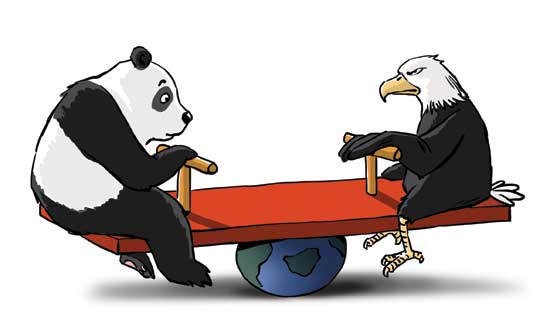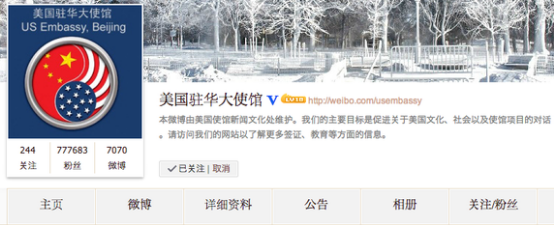I choose the article “Could China’s Unfree Internet Become Everyone’s Reality” to talk about this week’s topic. In this article, by citing former Chinese leader Deng Xiaoping’s opinion, the author firstly looks back the history of Internet development in China and the development of censorship of the Internet in China. As a result of censorship, the most popular websites in China are all Chinese-based and these websites are controlled by the Chinese government. In author’s opinion, Beijing concerns more about”cyber-sovereignty” rather than the Internet freedom, and this attitude of the Chinese government reflects they prefer more Internet independence rather than influenced by other countries’ foreign policies, especially the policies of U.S.. In author’s opinion, the Washington should worry about this fact, while what they do equals to give Beijing more power to control Chinese Internet.

The Chinese case support that “US foreign policy will remain largely determined by the country’s perceived political, economic, and military needs instead of the outcome of ethically structured modes of communication” (Comor & Bean, 2012, p. 216), and what Shirky said in his article that “a government’s demands for Internet freedom abroad can vary from country to country, depending on the importance of the relationship, leading to cynicism about its motives”(Shirky, 2011). Nowadays, as two of the most powerful countries in the world, China and U.S are not just only competitors, like U.S. and the Soviet Union during the cold war, but also are important partners of each other, especially in trade aspect. Actually, The United States is China’s second largest trading partner, the largest export market and the fourth largest source of import. According to the data released by Chinese Ministry of Commerce, in 2015 the value of trade between China and U.S. was 558.39 billion dollars. Because of these, U.S. concern about the relationship between U.S. and China and doesn’t want to break it because of their foreign policies of Internet.

In addition, in my perspective, the Washington’s somewhat more tolerant attitude towards Beijing’s Internet censorship in this Chinese case is somewhat due to that “this is not to say that popular movements will not successfully use these tools (social media) to discipline or even oust their governments, but rather that U.S. attempts to direct such uses are likely to do more harm than good”(Shirky, 2011). Taking Weibo (Chinese Twitter), which was referred in the article I chosen and in author’s opinion was under the control of Chinese government, as an example, actually there are some official accounts of American government or departments on Weibo, and they can post (maybe it is kind of propaganda) something not so sensitive. However, so if Washington intervenes Chinese social media directly or always posts something that will do harm to Beijing’s governance rather than regard Internet freedom as a long game, the current environment may not exist any more and this is absolutely what Washington doesn’t want to see.

Hi, Lin’ao,
I kind of agree with you that improving democracy in China is a long game, and even though there is still harsh censorship right now, thanks to the “parents’ are always right” thought that rooted deeply in Chinese culture, I think we have make many big improvements in the way of constructing public spheres. The idea of changing the environment in a short time is unrealistic. And we should not compare us with developed western countries like America, but to focus on the improvements that have been made. After all, huge differences exist among the history background and traditions between different countries. So it is unreasonable to urge every nation to be in the same high level of democracy or participation. Also, as Shirky noted, if America attempts to directly affect China, it may do harm than good. The Facebook and Instagram shut down in China can attest to this.
LikeLike
Shirky’s “environmental view” seems also to support an argument for why the U.S. even does business with countries with poor human rights records. Like you said, trying to force direct changes to China’s closed society won’t work and will only make the Chinese government upset and close the country off more from the rest of the world. By remaining an ally of China’s instead of an enemy, it could help the (very slow) flow of different (and not necessarily Western/American) ideas into China.
Still, this is not a very satisfying answer for why the U.S tends to ignore human rights issues in authoritarian business partners. The U.S. government believes it needs China as a trade partner. Strengthening China’s public sphere — by keeping the country more open to the rest of the world — would only be a side effect of that.
LikeLike
First of all, I think the cartoon you used with the panda and the eagle was a really funny and good way to show the balancing act these countries are going through to maintain their relationship. One thing that has always troubled me about politics and international relations is the ability for us as a nation to neglect one crucial negative aspect of a country to keep the alliance going. I definitely see the value of being trade partners with China and ensuring that there are no negative feelings but maybe it is up to us to stick up for the citizens of China and push for a little more freedom for them. I agree with you that it will be a long game because I don’t see us taking any action, I see us working hard to make sure we as a nation are doing well.
LikeLike
Hi Lin’ao,
You mentioned that because of these, U.S. concern about the relationship between U.S. and China and doesn’t want to break it because of their foreign policies of Internet. I agree with your opinion strongly. Two countries’s relationship is complex and multiple. Leaders cannot break the relationship with partners just in order to achieve their simple or one-sided goal. It reminds me of the wide-range anti-Japanese protests in the whole China in 2012. The protests happened since Japan want to “buy” Diaoyu Island. The protests extended from the Internet to the real life in order to ask government to punish Japan, taking some actions like reducing, even prohibiting trade with Japan. However, it is obvious that the Internet users’ proposal haven’t been adopted. Moreover, some activists on the Internet who gave some instigated opinion were arrested for avoiding more people being instigated. I thinks it is to some extent the display that one countries’s foreign policy on the Internet accords with these kind of relationship concerns.
LikeLike
https://irene8787.wordpress.com/2016/10/17/foreign-policy-and-the-internet-curb-terrorism/comment-page-1/#comment-39
https://yiliunewmedia.wordpress.com/2016/10/17/foreign-policy-and-the-internet/comment-page-1/#comment-35
https://osalbishri.wordpress.com/2016/10/16/foreign-policy-and-the-internet-is-the-u-s-fp-heading-in-the-wrong-direction/comment-page-1/#comment-45
LikeLike
I totally agree with the idea that Chinese government prefer more internet independence. The US is willing to build the long-term friendly relationship with China due to its economic and trade needs, thus it should keep its reputation and strengthen the public sphere in China, but the Chinese most influential (social media) websites are all under the strict surveillance by the Chinese government. Which means every words or contents that may undermine the government’s policy would be taken away. Besides in the same time, (the majority of) people are improbably to access with the information or public opinion worldwide, which means they would be easily oriented in mind. So the US government would surely hesitate to intervene Chinese online policy and online society directly.
LikeLike
Hi Lin’Ao,
Your post is interesting, and you actually pick two good quotes in your second paragraph. I have a similar opinion as you that the U.S. foreign policy toward Internet freedom in China is tolerant. I think U.S’ attitudes are mostly determined by political and economic interests instead of ethical and humanitarian standards. China is ranked as the worst in the world regarding Internet freedom, and still the United States is the biggest customer for the Chinese global market. The restrictions of the Chinese government on Internet freedom is unbearable. Although we have restrictions on freedom of expression on Saudi Arabia, in general, it is far better than China as I see it.
LikeLike
Shirky is a man, not a woman (you called him “she”).
Your choice of article is acceptable, although it is more factual than opinionated. What strikes me is this: “the Chinese government’s Network Monitoring Bureau … has broad discretion to access the account information of anyone online within China.” This must make it hard for foreign companies to do business in China, because at any time, the NMB could steal your trade secrets.
LikeLike